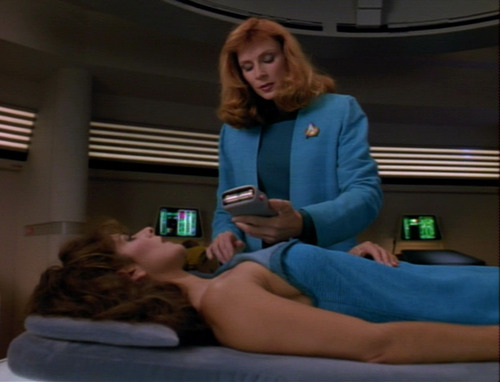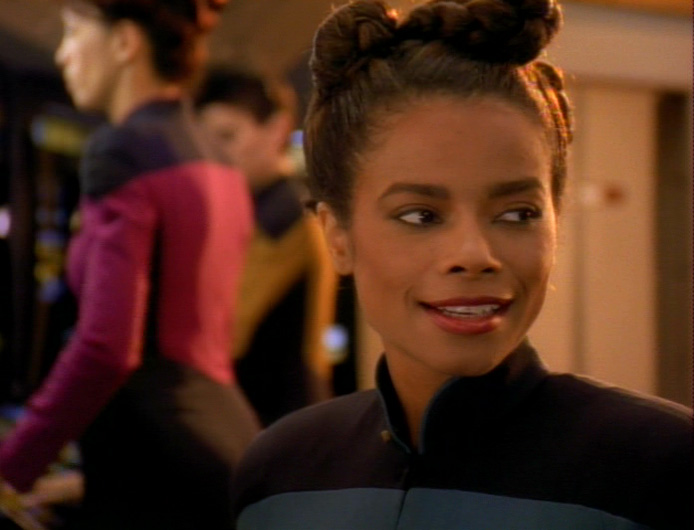I’m super excited to introduce a new collaboration between me and the fabulous Valkyrie Directive. We’re both doing complementary work trying to analyze representations of women in Star Trek, celebrate what worked really well, and make suggestions for what could be improved for future Trek incarnations. So we decided to record our discussions about some key topics around women, feminism and Star Trek. We’ll be taking turns posting new discussions hopefully a couple times a month. Our first one is on the narrative about the women of TNG being in “nurturing roles”. Enjoy and feel free to join in the discussion in the comments section below!
TrekkieFeminist: Both of us had definitely heard the argument that after Tasha died, the only two women main characters on TNG were in “nurturing roles”, and until recently I never really questioned that. When did you start realizing there was maybe an issue with that argument?
thevalkyriedirective: I’m not sure of the exact moment. I want to say that the idea never quite sat right with me, but I’m sure that when I watched Trek growing up I probably would have agreed with that argument! I think starting the Directive has definitely helped me look at arguments like that one more critically.
TrekkieFeminist: Me too. I think it was starting to really watch Enterprise recently. I had a moment where I realized Crusher (and Pulaski – more on that later) was the only woman doctor, but we never say the others were in “nurturing roles”.
thevalkyriedirective: Yes, exactly. I know at some point part of me went ‘hang on, why is it that because she’s a woman suddenly the role of doctor is “nurturing”‘? Why don’t we describe Doctor McCoy as nurturing? Or Doctor Bashir?
TrekkieFeminist: I know you stated it really well at one point. That it makes you wonder if the role of doctor was defined as “nurturing” because it was filled by a woman.
thevalkyriedirective: It might be a strange jump but bear with me – it kind of makes me think of chefs:
Women are traditionally the ones who make and serve food. That’s one of the most traditional roles a woman can have. And yet, when a man chooses to pursue it professionally he’s a chef.
Essentially, it’s the same job, but one is perceived with a huge amount of prestige and the other is seen as something that – up until recently – all women were expected to do.
TrekkieFeminist: Good point!
I think we need to distinguish “nurturing roles” from “nurturing characters”. I think it’s fair to say Crusher and Troi were nurturing characters. And there’s nothing wrong with that as long as there are other options. The inclination and ability to nurture isn’t innate to women. Certainly a guy can be nurturing. I think, if we want to stick to Trek characters. Chakotay is a good example of a nurturing male character. Also Sisko.
thevalkyriedirective: Yes, that’s definitely an important distinction to make. Even the whole idea of being nurturing I think needs to be questioned. What IS nurturing? It’s caring for someone, being supportive and understanding, caring about their life and their wellbeing.
Traditionally this is a “woman’s role” – men are supposed to be cut off from their emotions, to look at things rationally, to be tougher, that’s the whole idea of being “masculine”.
So really I think what people are saying is, Dr. Crusher and Deanna Troi are fulfilling a more traditionally female/feminine role.
TrekkieFeminist: I would’ve liked to see more episodes that showed their “nurturing roles” – a.k.a. their JOBS – as important. Taking care of a whole ship’s mental health? Super important! Same with being the ship’s doctor. But there are only a couple episodes (like “The High Ground”) that I feel emphasize that.
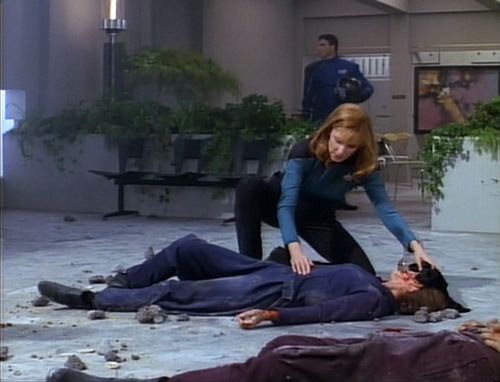
thevalkyriedirective: Yeah, I think that’s the thing that puzzles me the most. It’s almost like people think that Dr. Crusher’s role is less important because she’s nurturing, but they’d never say that about one of the male doctors!
TrekkieFeminist: Yes! I think Crusher is a great character but it’s a problem when nurturing is the only option for women. I want to contrast to Pulaski for a second. Her character was definitely NOT nurturing and people reacted really poorly.
thevalkyriedirective: Yeah, but I think the issue a little bit different there. Maybe it’s because I’ve literally just finished watching Season 2 again, for the first time in years, but I remember hating Pulaski when I first watched as a teenager. But this time around I enjoyed her a lot more and was actually sad to see her go!
I think the main problem was that the writers pitted her against Data, who at that point was already a beloved character. So the audience’s kneejerk reaction was to dislike her, because she seemed to dislike Data. I wonder, if they hadn’t done that, if people would remember her more fondly. Because watching it this time – and looking at it a more objectively – I think she was awesome.
TrekkieFeminist: Absolutely. But I do think there’s a sexist tone in some of the negative comments you see about her. I think it was harder for the audience to accept a woman character who was harder and less concerned about being liked.
thevalkyriedirective: I think the problem could be that audiences have trouble distinguishing bad writing for a character from the character herself – they read it as the woman character being bad/wrong or having negative traits, rather than the writing being at fault.
The writers, probably because they’re male, have a hard time writing women – sometimes they don’t seem to know what to do with them. And because of that… wishy-washy ness, or the questionable things they have the characters do, the audience sees the character as being wishy-washy.
TrekkieFeminist: So one thing I got asked and couldn’t answer, but maybe you have an opinion, is: why was TNG so good at making awesome, diverse, kick-ass female side characters (K’Ehleyr, Ro, Guinan, Lursa and B’Etor, Ensign Sito, etc. but wasn’t as good at rounding out Troi and Crusher’s characters?
thevalkyriedirective: Oh that’s an excellent question. Maybe… I haven’t done any research into it, but maybe it was that they’d established these characters and didn’t feel like they could break out of those confines or change the character?
TrekkieFeminist: It could be – a writer who’s just there for a couple episodes or submitting a spec script must relish getting to create their own original guest characters, but might be too restricted by “the book” on the main characters.
thevalkyriedirective: I think, when you look at all those side characters, they all have something in common: they have interesting back-stories and character traits.
Ro Laren comes from Occupied Bajor and has trouble with Starfleet and authority – that’s ripe for story potential. Guinan is the wise old woman, she’s mysterious, she’s powerful, she listens and gives advice. Even Tasha, whom I genuinely miss after watching Season 1 again, came from the failed colony of Turkana IV.

TrekkieFeminist: And regardless of the ridiculous armor, I love Lursa and B’Etor. Great to see some women thugs! And they’ve got the background of family intrigue
thevalkyriedirective: Exactly, there’s so much story potential in each of those characters. But let’s think about Dr Crusher for a second – what’s her back-story?
TrekkieFeminist: Basically Jack died and she’s a mom and Picard had a crush on her.
thevalkyriedirective: Exactly. Where’s the story potential there? What part of that is ripe for conflict or exploration?
TrekkieFeminist: Not a lot! Except romantic and mother-child conflict.
thevalkyriedirective: And Deanna, she’s half-Betazoid half-human, her father died when she was young and her mother is well… her mother’s probably the most interesting part of her back-story. Which is probably why she shows up so often.
TrekkieFeminist: And she used to be with Will, so both of their back-stories are defined in relation to a male character on the ship.
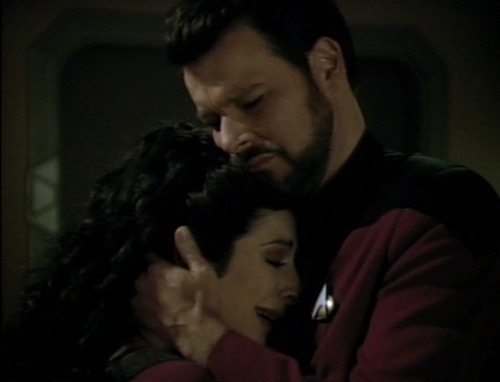
thevalkyriedirective: Compare that to someone like Data – an android trying to learn what it means to be human. Or Worf, an orphaned Klingon raised by Humans, serving in Starfleet. It’s no wonder both of their characters were given so much to explore, and had so many good episodes.
And yes, great point about Riker and Picard. I think that’s another reason people adored Tasha – she wasn’t defined by her sexual tension with a member of the main cast.
So I think the issue goes beyond their nurturing roles – it’s really about how flimsy their characters are. But I think the problem with the “nurturing roles” thing, is that it gives the audience a reason to write the characters off completely, as opposed to say, Riker and Geordi. Their backstories are just as bland. Don’t get me wrong, they’re still great characters, but there’s not much meat there either.
TrekkieFeminist: Very true. And I think we should stop saying they’re in nurturing roles and start saying they’re more traditionally feminine, nurturing characters.
thevalkyriedirective: Yes, definitely, that’s an important distinction to make. It comes back to the very first argument I made, in my first Directive article, about Deanna’s role on the ship. That just because she had compassion, and empathy, and cared about the crew, that didn’t make her weak!
I find it so problematic that people look at Doctor Crusher and Deanna and see “nurturing” when, if they’d been male characters, they wouldn’t have the same problem.

TrekkieFeminist: Agreed. Those things aren’t bad, as long as they get treated as important by the rest of the crew and the plots. A problem with Deanna was that the writers couldn’t figure out a way to really demonstrate how valuable her counseling skills were.
If we got to re-do TNG basically I’d have liked to see a third regular woman character maintained, who was less nurturing and in a less-traditional role, to show there are options. And then I’d like to have more episodes where Troi and Crusher’s skills are important to the plot.
thevalkyriedirective: I completely agree. I wish they’d found a way for Tasha to stay, she filled that role perfectly. I think Ensign Ro did that as well later, but she wasn’t quite a regular.
But back to one of our earlier points – Doctors McCoy and Phlox had the same level of compassion and care and devotion to healing and I’ve never, ever heard either of them described as “nurturing”!
TrekkieFeminist: Even Bashir gets to that level later on, for example how he relates to patients and Jake in “Nor the Battle to the Strong”.
thevalkyriedirective: Definitely. But the way the audience perceives him is completely different from the way they look at Dr Crusher! And no one thinks Sisko is weak just because he’s a single parent raising a son – all I’ve ever heard is praise for that father-son relationship!
And yet, poor Bev is described in such negative terms, even though she’s an amazing Doctor – good enough to run Starfleet Medical! – and raised a son by herself.
TrekkieFeminist: I think it didn’t help that Picard was so down on Wesley at first. Having the Captain be unsupportive of how important your role as a mom is, it makes it hard for the audience to value it.
thevalkyriedirective: Ooh yes, that’s such a good point. I think that definitely didn’t help at all.
Watching the episodes again I have such a hard time understanding this perception people have about Beverly, because she’s so… fierce and devoted and never backs down. I just don’t see what they do.
I re-watched “The Enemy” the other day and Beverly is trying to save a Romulan, but of course, Worf is the only one with the compound to save him. Watching that, no one should ever be able to describe her as weak. She’s so angry and she doesn’t give a shit about Worf’s moral issues – well, she does enough that she doesn’t literally strap him down and force it out of him – but you kind of get the feeling that she’s pretty damn close!
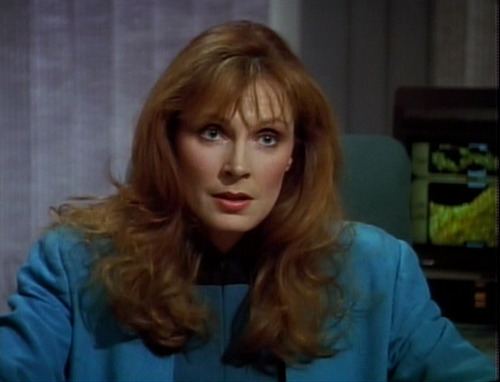
TrekkieFeminist: I think Bev gets more of those kick-ass moments and they’re awesome. Maybe that’s part of why I don’t think she’s disliked/disrespected quite as much as Troi. Troi feels strongly but comes across much more passive.
thevalkyriedirective: I think the problem is that the writers had no idea what to do with Troi. Watching these early seasons, she’s just so passive. She just kinda sits there watching everything happen on the Bridge.
In “Who Watches the Watchers” she’s the one who did her homework on the Mintakans and is super prepared for their mission, but then she spends the rest of the episode being captive having to keep her mouth shut.
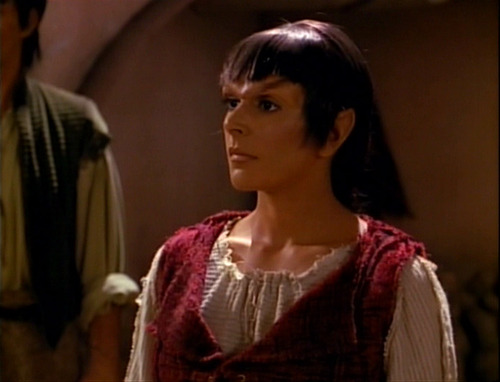
I watched “The Defector” last night and she had ONE SCENE, when the whole episode is about figuring out if this Romulan is truly defecting or not. They were having a conference, trying to figure out if he was telling the truth and I just shouted at the screen: “Where’s Deanna? She could tell you!”
Then, thank goodness, they cut to a scene of her and Will interrogating the Romulan, but that was it! And she didn’t even have much to say other than that he was holding back something important
TrekkieFeminist: Agreed. I like what Marina Sirtis says about how before they put her in the real uniform she was like a “potted palm” on the bridge – just there as an ornament.
thevalkyriedirective: Oh wow, that sums it up perfectly.
Because you know who else really didn’t have much of a meaty backstory? Geordi, but he was running Engineering after season 2, and being BFFs with Data, so that didn’t matter.
TrekkieFeminist: I was just thinking, what if they’d switched Troi and Geordi’s jobs?
thevalkyriedirective: That’s a brilliant question! I wonder how much would have changed. I wonder if the role of ship’s counsellor would have been given more respect if it was a male character. Because there are plenty of male therapists.
TrekkieFeminist: I think yes, unfortunately. I feel like we’d take the role more seriously. That said, I probably would not go to Geordi for relationship advice. Although actually, I probably wouldn’t go to Troi either. She keeps falling for creepsters.
thevalkyriedirective: Ahaha, so true.
There shouldn’t be anything wrong with showing women who are supportive and caring! But it’s an idea that seems to pervade a lot of responses to Star Trek. Even thinking about characters like Keiko O’Brien, or Kes, I’ve heard far more unfavourable comments about them than I have Kira or Dax or B’Elanna.
TrekkieFeminist: Same with negative comments about the only other counsellor: Ezri.
thevalkyriedirective: The more I think about it… Why is it always the female characters who have a “problem”? They’re too feminine, or they’re too masculine, or too aggressive, or they’re just dressed ridiculously so they’re highly sexualized… I think it comes down to the people in charge, who – as we discussed in Behind the Scenes week – are mostly men.
TrekkieFeminist: Agreed. Like if you look at that section of comments I pulled on people hating on Janeway. In many ways it’s like women characters can’t win. Half the commenters thought she was too feminine, frivolous and indecisive, and the rest thought she was too cold and bossy.
thevalkyriedirective: I think the audience, in general, has a lot more trouble with the female characters. They always seem to feel like there’s something wrong with them. Whether they’re written in a way that’s problematic or not, the audience finds fault with them, even though the male characters can be just as problematic!
And yet you don’t often hear people talking about Kirk being too romantic (that’s CELEBRATED!) or Picard being too aloof – people find those characteristics charming or laugh them off as part of the character.
TrekkieFeminist: I think that’s because there are so many conflicting ideals for women in our society. The characters reflect that, especially when they’re created by men. Not every woman character has to embody all the best character traits possible. The writers just need to think through an original identity like they would for men. And I think the more we see that the more the audience will appreciate it.
thevalkyriedirective: So I think really what this comes down to is: women doing exactly the same job as men, but being seen as weak or unimportant.
TrekkieFeminist: Totally. Calling the doctor and counsellor “nurturing roles” is really problematic and it only happens because there are women in those roles. Yes, the options for women characters were limited, but that doesn’t make the jobs they were doing less important.
thevalkyriedirective: Yes exactly, and I find it really frustrating that people have this skewed perspective about both characters just because they’re women in nurturing roles.
TrekkieFeminist: Hopefully we’re helping to change that and get people to think a bit more.







